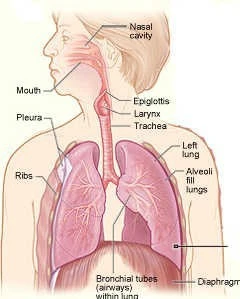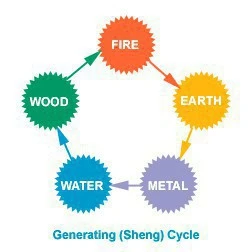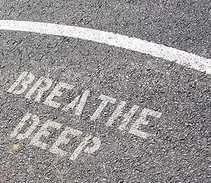My Lungs Are What? Melancholy, Fall, and A Good Deep Breath
This is the fifth and final edition in my general introductory series to the five main organ systems (5 elements) in Traditional Chinese Medicine (TCM). As we are heading into fall we are entering into the Lung phase of our body's seasonal cycle. Similar to previous articles on the Liver, Kidney, Heart, and Spleen systems, this article will discuss in detail what the lung system means within Chinese Medicine and the relationships it has to specific mental states, diseases, and your ability to maintain health. Hopefully after reading this article the next time your acupuncturist says you have "Lung Qi Deficiency" you won't stare back and think what is this crazy acupuncturist talking about...
More important than regaining the image of your acupuncturist as a sane person however, is regaining awareness of these connections between seasons, our emotions, our health and our lifestyle. While life is unpredictable certainly working against the normal ebbs and flows of the world will bring about imbalance, while working with the natural world in as much as possible will bring us greater health. Out of all of our systems of medicine, Chinese Medicine has the living tradition within which these relationships are explained and utilized.
As discussed previously within this series, Chinese Medicine uses organ names to describe an entire system of connections within the body. The "lung" system from a Chinese perspective describes the physical lungs, the lung acupuncture meridian, lung system related disharmonies (or patterns) and any number of western conditions from allergies and asthma to frequent colds and flus to depression and grief.
In previous articles we also discussed the zang (solid) and fu (hollow), or simply yin and yang system pairings within Chinese Medicine. As the spleen is paired with the stomach, the liver with the gall bladder, the heart with the small intestine, the kidneys with the urinary bladder - the lung is paired with the large intestine. In one sense the lung is a part of what we bring in (or cannot bring in) and the large intestine is a part of what we get rid of (or cannot rid ourselves of) - which has obvious physical and psychological implications.
About The Lungs:
 To start our discussion, lets bring in a general western description of lung function in the body to help us compare viewpoints between the east and the west. The lungs have a number of blood vessel connections which allow their function of oxygenating the blood to happen along with the removal of carbon dioxide from our body. This oxygen rich blood is quickly transferred to the heart and then pumped through our entire body to enrich our muscles, organs and tissues. While we can go sometime without food or water, without oxygen we cease to live quite quickly.
To start our discussion, lets bring in a general western description of lung function in the body to help us compare viewpoints between the east and the west. The lungs have a number of blood vessel connections which allow their function of oxygenating the blood to happen along with the removal of carbon dioxide from our body. This oxygen rich blood is quickly transferred to the heart and then pumped through our entire body to enrich our muscles, organs and tissues. While we can go sometime without food or water, without oxygen we cease to live quite quickly.
The process of breathing requires our diaphragm and muscular contractions in the abdomen and chest. And while we can regulate our own breathing to some degree with exercise, physical control of the process, and stress - most of this happens without conscious effort. Our respiratory system relies on our respiratory control center in the brain (located within the medulla oblongata) and various sensors throughout our muscles, lungs and blood vessels. The sensors help to regulate when certain tissues need more oxygen (such as during exercise) or when the air is unhealthy for us to breath (chemical irritants, various allergies, etc.). Part of allergies, asthma, sneezing, and coughing are related to these sensors.
 To segway into our Chinese Medicine discussion I wanted to highlight a particular five element relationship between the earth element (spleen) and the metal element (lungs). This pertains directly to the concept of dampness we discussed in the last spleen article and how this impacts allergies and asthma particularly. (For more on the five elements generally, read this article or for more clinical details, this section). As you can see from the five element chart the spleen (earth) helps feed/support the lungs (metal). If the spleen is weakened from a poor diet that is high in dairy particularly (but also too much cold/raw foods, fried foods, juices, etc.) and bad habits such as eating too quickly or at odd hours then dampness will result. With dampness present in the system the spleen cannot properly nourish the lungs and then their function will begin to suffer by way of allergies and asthma. (For more on allergies, specifically read this article). It is only by respecting the relationships between all of the systems of our body that we can truly maintain our health.
To segway into our Chinese Medicine discussion I wanted to highlight a particular five element relationship between the earth element (spleen) and the metal element (lungs). This pertains directly to the concept of dampness we discussed in the last spleen article and how this impacts allergies and asthma particularly. (For more on the five elements generally, read this article or for more clinical details, this section). As you can see from the five element chart the spleen (earth) helps feed/support the lungs (metal). If the spleen is weakened from a poor diet that is high in dairy particularly (but also too much cold/raw foods, fried foods, juices, etc.) and bad habits such as eating too quickly or at odd hours then dampness will result. With dampness present in the system the spleen cannot properly nourish the lungs and then their function will begin to suffer by way of allergies and asthma. (For more on allergies, specifically read this article). It is only by respecting the relationships between all of the systems of our body that we can truly maintain our health.
This function describes the critical role of the lungs in both bringing in "qi" (energy) from the air we breath and in being a principle force for the nourishment of all of our muscles, tendons, organs and tissues through its role in oxygenating our blood. A weakness in this function can lead to lung related conditions such as shortness of breath but also generalized fatigue of the entire body.
"Dominates" Distribution and the Skin and Hair:This function again describes the role in dispersing energy throughout our body. More specifically the lung in this function disperses qi and body fluids to warm and moisten the muscles, skin and hair. This can be thought of as spreading the morning mist throughout the body.
The skin and hair in this context also includes the sweat glands which are part of our ability to get rid of things we don't need as well as to protect us from "invasions" from the outside. The common cold, for example, is thought of in Chinese Medicine as a "wind-cold invasion." This can happen when the lung system is too weak and the protective layer of our body (also called the "wei-qi") allows the "cold" to enter into our body. This is why we use famous herbal formulas such as Yin Qiao to help treat colds. Functionally these formulas induce perspiration to "push" cold out through the sweat glands and help strengthen the lungs so this doesn't happen again.
Along that note, we all know those people that get colds frequently and they very often turn directly to bronchitis or some other deep manifestation. Within these people not only is the protective energy (wei-qi) weak, but the deeper layers of the lung energy are weak as well. This in effect makes an open path from the outside directly to the internal lungs with no protective barriers.
An imbalance in this function, then, can lead to colds, flus, bronchitis, as well as to frequent spontaneous sweating and other sweat related conditions (except night sweats which are most often Kidney Yin Deficiency).
"Dominates" Descending and "Regulates" the Water PassagesThe descending aspect of the body describes a general flow of energy from the upper part of the body to the lower which further describes the dispersion functions. It also serves to illustrate that when this function is weak chronic cough, for example, can arise which is energy ascending rather than descending due to weakness.
Regulating the water passages in this context further describes the sweat glands and their role but also provides more context for the descending action of the lungs. If you view the five element chart again above you will see that the lungs (metal) help feed the kidneys (water). From above we are reminded that the Kidneys are paired with the Urinary Bladder and have an obvious role in urinary issues. The descending function of the lung helps to feed the removal of water within our body via the bladder. An imbalance in this area can lead to edema (swelling) in the lower body or any number of urinary problems.
"Opens" into the NoseAs anyone with allergies can attest, we need our nose for breathing. The energy of the lung system is required for proper respiratory and olfactory functions of the nose. When this function is working well we will breathe easily and our sense of smell will be sharp. An imbalance in this function can lead to a stuffy nose, among other symptoms.
The throat is also part of respiration and accordingly is influenced by the energy of the lung system. Weak lung energy will often manifest as weak speech or a constant hoarse voice.
What Symptoms May Arise?Colds, flus, allergies, and asthma are among the most common lung issues. This along with other deeper western issues such as COPD, bronchitis, sinus infections and more. What stands outside of common western conditions is the process by which certain people catch more colds and flus primarily and the process by which many others have colds that go deeply into their bodies very quickly. Also outside of western medicine is the relationship between the lungs and overall immunity, sweat and urine related issues, and relationships with depression and other psychological states.
Lung System Patterns and Their MeaningsAs with the other organ systems, Chinese Medicine treats "patterns" and not specific conditions. Another way to look at this is to treat the "root" and not chase after symptoms. Generally lung related patterns fall into two categories - those that arise from an excess in the body (often externally derived) and those that arise from an internal deficiency/weakness of some nature. Let's look at two of the most common.
The first common presentation is essentially the common cold in western terms - what we in TCM call a "wind-cold invasion" or a "wind-heat invasion." A wind invasion in this case refers to something contracted from the outside - like a cold, flu, or other infection. The main signs would be body ache, stuffy nose, scratchy throat, etc. with wind-cold having more chills than fever and clear/white mucus and wind-heat having more fever than chills with yellow mucus.
Another common presentation is "Lung Qi Deficiency." This is generally the pattern that people have when they catch colds all the time and often experience them turning into worse conditions such as bronchitis. The general signs are generalized fatigue, shortness of breath, a weak voice, spontaneous sweating during the day, and a pale complexion.
To see all of the lung related patterns and general treatment points you can read the Lung Related Disharmonies page.
The Lungs and the Emotion of GriefAll of the organ systems have an associated emotion - for the heart it is joy, for the liver it is anger, for the kidneys it is fear, for the spleen it is worry and for the lungs it is grief. As humans we naturally experience a range of emotions and the proper expression of them is simply a part of life. When something good happens to someone it is right that we would feel happiness or joyful. When a close friend passes on it is right for us to express our sadness and grief.
On the emotional side of things, what Chinese Medicine is concerned with is when these expressions are either repressed, unable to be expressed/experienced, or are expressed without control or without proper context.
When the lung qi is deficient you can experience an overwhelming constant sense of grief that does not ease. This deficiency then can lead to what we know as depression and related conditions in western terms.
What Can I Do to Keep My Lungs System Strong?
 A very helpful tool to strengthen the lungs on an emotional and physical level is deep breathing (diaphragmatic breathing) as it is often practiced in meditation, tai chi, yoga, and various other breathwork therapies. The breath is really the gateway to releasing many physical and emotional issues and simple breathing techniques can greatly improve a number of lung related issues.
A very helpful tool to strengthen the lungs on an emotional and physical level is deep breathing (diaphragmatic breathing) as it is often practiced in meditation, tai chi, yoga, and various other breathwork therapies. The breath is really the gateway to releasing many physical and emotional issues and simple breathing techniques can greatly improve a number of lung related issues.
From a dietary perspective certainly reducing mucus generating foods such as excessive dairy, too much raw/cold foods/juices, fried foods, etc. will go a long way towards aiding any cases of allergies, asthma, or sluggish energy (emotionally or physically). From a five element perspective the lungs are aided by the "pungent" flavor so foods with this quality tend to strengthen the lung energy. A few examples of good foods for the lungs are those that help immunity and/or reduce mucus (garlic, ginger, cinnamon) and those that fall within the pungent category (navy beans, almonds, broccoli, onion, radish, pears). See (five element nutrition therapy).
From a seasonal perspective, the lungs are the principle system active within the fall. Keeping them strong will help to avoid the seasonal colds and fall time allergies. On an emotional level, however, fall is a good time to begin to recoil from the outgoing summer months and to begin to slow down (if ever so slightly) to harness our energy as we will need it for the winter months. It is a good time to be more introspective and to work on resolving, or at least coming to terms with, any underlying emotional issues. Walks in the crisp dry air with deep breaths will aid this immensely.
tag @yinyanghouse for questions/comments